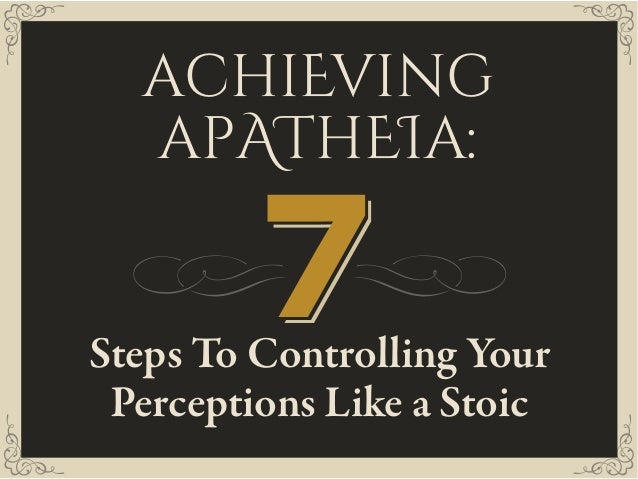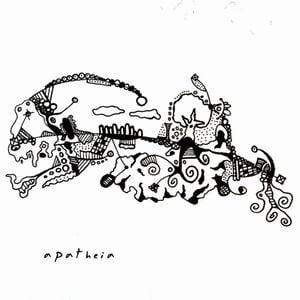Apatheia
With Apatheia (Greek ἀπάθεια Apatheia " insensitivity ", " serenity " ) is called in philosophy the dispassion and equanimity. In philosophical parlance, the term usually connotes positive, the Apatheia is highly desirable. Completely different is the medical term use; in medicine is meant by apathy ( listlessness ) is a disease symptom.
Ancient Philosophy
The term Apatheia referred to in the ancient Greek language in general, the property of a thing or a person to not be subject to influence by something external. If it is a person, the lack of feeling movements and states of mind is meant to be triggered by sensory perceptions. In the mind of the person who is present at the Apatheia, is triggered by the perception of events in the outside world, no excitement. Therefore, he is dispassionate, frugal and self-sufficient; Longing and desire ( epithymia ) are as foreign to him as fear. In a broader sense is meant by Apatheia the absence of all emotions, including the pleasant, which are usually considered desirable. Often, however, the term Apatheia is used in a narrower sense in the ancient literature that only or primarily unwanted emotional excitations are meant to be negatively perceived, and from a philosophical point of view.
In the ancient philosophy Apatheia was understood in the moderate sense than suppression and control of painful and destructive emotions such as anger, fear, envy, and hatred, in the radical sense than complete extirpation of such emotions. She was (at least in temperate sense) as a prerequisite for the realization of ataraxia ( firmness of mind ) and was considered as high or even supreme good. In this sense, Antisthenes, the founder of Cynicism, Apatheia understood as a desirable goal, which he put Socrates as a model. The Stoics took this idea and made it a central part of their teaching. Liberation from the tyranny of drives and affects should enable serenity and peace of mind and sanity contemporary action. The disapproved affects also included the compassion and remorse, as they cause grief, which is not acceptable for a Stoic sage. Because pity and envy are the cause of grief, they were put on the same level. Perfect Apatheia was considered a mark of the Stoic sage. So wrote the Stoic Marcus Aurelius:
" Being the cliff equal to the constantly break the waves. But you is unshaken, and around them calms the surf. "
The Apatheia was not purely perceived negatively by the Stoics as a mere absence of unwanted emotional states, but also positively resistant attitudes (Greek Hexis ) of equanimity. So overlaps the concept of Apatheia with the ataraxia. The Apatheia was not considered a single virtue, but as a disposition, which forms the basis for a virtuous and rational contemporary life.
The relief from unwanted emotions was mainly propagated by the Cynics and Stoics, but also the other philosophical schools agreed more or less consistent with this goal because ataraxia was for all (even and especially for the Epicureans ) a good of the highest order. A classic formulation for the ideal of the world superior people found Horace in the famous verse:
At issue was how far one should go in the liberation of the emotions. In the Platonic Academy particularly the philosopher of Soli Crantor turned against a radical demand for Apatheia. He represented in his writing about the grief the conviction, the grief of the bereaved to a deceased person is naturally and therefore permit. Only excessive and therefore unnatural passions are to suppress. Indolence is incompatible with human nature and lead to bestiality. The Peripatetic rejected the Stoic idea, perfect Apatheia is attainable and desirable. They followed the teachings of its founder, Aristotle school, after which affects not eradicate, but to bring just the right amount are ( Metriopathie ). Counter exaggerations also Cicero turned to the argument that callousness is inhuman, because man does not consist of stone. Against the accessibility of Apatheia has been argued that the sensation of pain (Greek Pathe ) given by nature and, therefore, total liberation from them is illusory. The thesis Apatheia was desirable, was held against the affects wore to obtain the virtue in their eradication and impairs the ability to act virtuously.
Against the charge that the Stoic way is hard and unfeeling, the Stoics defended themselves. The Roman Stoic Seneca said, the emergence of emotions and involuntary being moved by it can not be avoided, but probably it was the Stoic sage possible to grant the affects no power over yourself and not to let his actions determine which of them. Similarly, moderate had already expressed in the 3rd century BC Chrysippus of Soli. There were also representatives of radical positions; the Megarians Stilpon, the ethics advocated similar views as the Stoics said to have been of the opinion that the manner influenced not only by the emotions remain, but they do not even verspüre.
The Neoplatonists, who laid great emphasis on cleaning of mind and advocating asceticism, were of the view Apatheia as freedom from passions is the natural state of humanity redeemed by ignorance soul of the philosopher.
A particular philosophical problem presented the divine Apatheia dar. Aristotle had the divine " first unmoved mover " characterized as immutable and expressly attributed to him Apatheia. This corresponded to the spread in circles philosophers believe that a god does not feel any needs and there can be nothing that is desirable for him or bother him. From this notion of divine self-sufficiency went in the 2nd century BC, the skeptical thinking Platonist Carneades from when he formulated the problem of divine Apatheia. He argued that every living being as such necessarily having a sensibility for pleasant and unpleasant, for pleasure and pain. This therefore also applies to one -conceived as a living God. If, however, had a god of some displeasure, so this meant a change in his mind to the weaker way, and this is an element of transience. But immutability and immortality are defining features of a god. Therefore, is the notion that there are gods, contradictory.
Judaism and Christianity
From the Stoic tradition of the Jewish philosopher and theologian Philo of Alexandria took over the Apatheia - ideal. For him, the liberation of harmful emotions was (which he also scored pleasurable, but sinful in his view, emotions ), or at least their bridling a religious duty. Similarly, thought numerous Eastern church fathers like Clement of Alexandria, Origen, Athanasius, Basil, Gregory of Nyssa and Evagrius Ponticus especially. As the Church Fathers, who advocated Apatheia, were very influential in monastic circles, in the monkish asceticism of the East became an important role the Apatheia - ideal. The Christian authors, however, did not represent the most radical variant, according to which all affects are only disorders, but in a more or less moderate versions. The influential writer John Cassian contributed to such mediation body of thought in the West.
The Latin -speaking Church Fathers, the world of thought shaped the teaching of the Western Church, the emotions tend to be evaluated more positively than the Greek-speaking east; especially Augustine and Jerome rejected the ideal of Apatheia (Latin impassibilitas ) from largely.
In Christian theology introduced the concept of Apatheia in terms of the understanding of God a problem dar. These were, in principle, to the already recognized by Carneades dilemma. On the one hand, the idea of God's eternal perfection and happiness seemed possible that he is subject to changing affective states; other hand, suggested the sufferings of Christ and the fact that in the Bible God wrath and zeal be attributed to the assumption that there are emotions of God, which are difficult to reconcile with Apatheia. The church fathers decided in accordance with the Greek philosophical traditions for the answer that I'm associated with affects restlessness and changeability of God out of the question, therefore, is to start from a Apatheia God. Occasion, there are, however - such as Ignatius of Antioch and Origen - including individual statements to the contrary, without leading to a resolution of the contradiction.
The same result as the Fathers came the Jew Philo of Alexandria, who explained the details of the Tanakh on a angry and jealous God as adaptations to the limited comprehension of ordinary people. He stopped and turned to God for uninfluenceable particularly strongly against the idea that God could regret a decision. On the other hand, he accepted the assumption of compassion of God, that was not consistent from one Apatheia of God.
For the suffering of Christ, the followers of Docetism found a radical solution. They taught that Christ had only apparently had a human body and therefore suffered only apparent. So they kept the concept of the divine Apatheia. An opposite position represented the followers of Patripassianismus that emphasized the unity of God and criticized the doctrine of the Trinity. They concluded from the principle of the unity of God, that not only Christ but also God the Father had suffered at the crucifixion.

.jpg)








:format(jpeg):mode_rgb()/discogs-images/R-2104629-1268557753.jpeg.jpg)